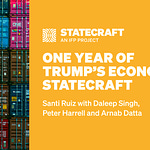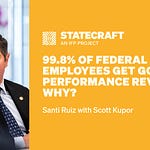Congress is notoriously slow to embrace new technology, and existing systems are out of date. We’ve previously covered the shuttering of the Office of Technology Assessment, and how it may have made Congress weaker.
Today’s interviewee is Matt Lira, who has held a wide range of insider roles: Deputy Executive Director of the National Republican Senatorial Committee, Senior Advisor to House Majority Leader Eric Cantor, Special Assistant to the President for Innovation Policy and Initiatives in the White House Office of American Innovation from 2017 to 2021. In the White House, he coordinated policy initiatives to modernize legislative operations, including organizing the first Congressional Hackathon, the first use of the Facebook API by Congress, and the development of the first Congressional mobile app.
We discussed:
Why is Congress so slow to adopt technologies that would significantly ease operations?
How did a Congressman unilaterally introduce live-streaming of Congressional hearings?
Would a Google Docs-style comment system for legislation ever work?
What would Davy Crockett’s social media presence be like?
Thanks to Rita Sokolova for her judicious edits.
For a printable transcript of this interview, click here:
Describe for me Congress's digital competency as an institution, as it stands right now.
I think about this question on two tracks. The first track is the digital competency of Congress’ operations: how they conduct the legislative process, engage with constituents, etc. The second track is digital competency as it relates to the policymaking itself. Progress is being made on both, but there are still ample opportunities and, frankly, a need for improvement in both lanes.
On the operational side — and this is a statement I make with great respect for the progress that's been made and the people who have worked on it, and I'm not sparing myself in that criticism or challenge — there's a delta between how people live their daily lives and how they engage in the legislative process or with their representatives. That delta poses a problem, because it becomes harder for people to substantively engage in the legislative process, and it's also more difficult for legislators to share the progress they’re actually making.
When I testified to the Select Committee on the Modernization of Congress in 2022, I said that Congress is like a student who does their homework but fails to turn it in at least some of the time. There are areas in which tremendous progress gets made on policy. These aren't always the big macro issues facing our society, but often niche issues that are incredibly important to a specific constituency. But even within that constituency, people are unaware that it's happening. In my view, that's largely driven by a disconnect between the digitally native way we live most of our lives — how we manage our finances, how we run our household, how we decide where to live, how we call a ride-sharing app to get around town — and how we would interface with Congress.
By the Schoolhouse Rock model of how Congress works, congressmen and women have a massive incentive to publicize their wins. So why is it still hard for legislators to share their successes?
Yeah, great question. The incentives are clearly there, but the institutional capacity isn’t. There are two reasons for that. The first is just that it's a large organization; any large institution, whether it's a university or a company or a government agency, is going to struggle to keep pace with rapid technological change. Congress is no exception. The second reason is that Congress, particularly the House, has 435 independent constitutional offices. Those offices operate within a larger system that provides some capacities, but they also each have the constitutional authority to operate their individual office in the manner that they choose, within certain ethical and legal guidelines. Moving an institution like that forward is particularly challenging.
But that challenge also creates an opportunity. If you take the bell curve of how members use technology to keep constituents informed and engaged, you get notable examples who are in the top 5% and as current in their use of technology as a leading business or an influencer. On the very other end of that bell curve, you have members and staff who've been there a long time and think, “Look, I don't need that to get reelected and I don't want to learn this new system.” They're not just struggling to get to the next level, they're overtly hostile to change. And sometimes not without reason — if they don't need to do it, they shouldn't do it for its own sake.
The batting average in the middle is what concerns me. Are they moving in the right direction and are they moving fast enough? Over the course of my career, we’ve seen that progress does get made and the batting average improves, but the technology is moving so rapidly that you’re still always one step behind. You move two steps forward but the technology moves four steps forward, so you're still an institution that's behind. People on the inside will say that we need to do better. If you’ve spent five years working on something and you're like, “Look at all these things we've done, we did this and this and this,” it can almost come across as defensive, but nevertheless the delta remains the same. Props to them for not letting the delta grow, but the challenge is actually to close the delta.
I've long felt that there's a natural cycle to the House, because members retire and get defeated in elections. The new members, and those who stay because they're innovative in how they connect with their constituents, lead to a natural improvement over time. But there's still a long way to go.
Have there been improvements in Congress’s capacity to use technology for its own internal day-to-day operations? Where do you really see that delta?
Let's take it from the perspective of a rank-and-file office, which is the personal office of an individual member of the House. That office primarily deals with their representative and the district they represent. These are not huge organizations because the budgets are relatively flat, and with inflation they might even be getting smaller.
You have a certain number of working hours in a week across the whole team. A disproportionately large number of those working hours are being spent on filtering incoming messages — this is perhaps one of the least exciting issues I could have chosen, but in some ways, it's the most important one. For the sake of simplicity, let's say an office has 10 working hours for the week across the entire staff, and four of those working hours are legislative correspondents (LCs) filtering inbound messages and categorizing them for different kinds of responses. That’s 40% of your capacity getting spent on a repetitive task.
Without even getting into how some of the emerging AI technologies could solve this, there are mature automation tools that you could use to reduce that time spent to less than half an hour per week. That would liberate the rest of that time for higher order tasks, whether that's proactively communicating with constituents or doing legislative research and oversight. And that's just one office. If you take that and apply it across all 435 offices, you've unlocked a ton of institutional capacity. To me, it's the most powerful example of where technology is not being leveraged to increase the efficiency of these admittedly unglamorous problems.
Look, if you're on the Hill and you follow the typical career path from intern to staff assistant to LC to legislative assistant (LA) to legislative director (LD) or chief of staff, you’re like, “Oh, good, I don't have to deal with that problem anymore. I paid my dues because I spent my year filtering the messages.” This is not true of everyone, but it becomes a lower priority problem to solve, and in some ways it's almost glorified.
Surely folks in the more entrepreneurial offices think this is insane? Why don't we see more variation in tech uptake among offices?
We do. With that bell curve, we do see that 5% on the bleeding edge experimenting. But, candidly, a lot of that experimentation has focused on external communication. It's almost like they need to hire one of those business transformation experts to just go in and work on these internal problems. There's only so much time on the clock, so a lot of the innovations have been focused on things that would be more visible to the public, and for reasons that I completely understand. That said, there's a second-order effect to solving problems like message filtering that unlocks a lot of opportunity.
It’s also a matter of resource constraint — it's not within the resource capacity of most individual offices to solve that problem alone, because they already have tight budgets. If you spend a dollar on process automation, that dollar is not going to bonuses, not going to salaries, not going to travel, not going to events. And even if you spend your whole budget on it, one office alone probably couldn't solve the problem.
From my perspective, it’s a tragedy of the commons. It would be highly appropriate for the institution to step in and say, we're going to help solve this by enabling enterprise contracts across the board. That gets into the more administrative pace problem that we touched on earlier. It takes a long time, and by the time they figure it out, the technologies have left them in the dust. It's challenging because we’ve known about this problem for at least 10 years and different offices and individuals have made attempts at it, including myself. But then the member loses or the staff goes on to something else, and it gets lost.
There was a recent story about TikTok users overwhelming Congressional offices with thousands of messages. A bunch of folks have been saying that with new AI models and the adversarial use of LLMs, that will continue and federal systems will start to get flooded. Is that a real danger?
It is a danger, but it's not a new one. In some ways it proves the point about technology moving four steps at a time and improvements moving two. In 2011, President Obama said something like, “Call your congressman,” in a speech and then the phone lines were melted for like two days because so many people answered the call. Then during the SOPA/PIPA debate, Google and Reddit and others put something like “Call your legislator” on their homepages, and the phone lines crashed and email systems were strained.
So leveraging technology platforms to enable widespread activism isn't new. As you said, the technology gets better and presents more risk, like with LLMs that could potentially even impersonate authentic grassroots activity, but my view is that it's Congress’ responsibility to get better at engaging with the people rather than the people having to figure out how to engage with Congress. Rather than saying, “Joe citizen, Jane citizen, you have to learn our system to talk to us,” they're going to have to adopt new technologies and systems to prevent and check against abuses. Fortunately, I think that's the approach that they're taking.
Whenever things change, like with email in the late ‘90s and early ‘00s, it’s a natural reflex to say, “We’re getting flooded, we can't handle it.” And as we just touched on, Congress has yet to truly grapple with how to handle it completely. But they came up with ad hoc solutions, some of which remain in place today.
What kinds of ad hoc solutions?
Like throwing people at the problem. I could be wrong, but if we went into an office in 1980, I don't believe we'd see an LC struggling to filter all of these invalid messages for half the day. They'd get a stack of mail and they'd filter it by hand. They probably had different problems, like spending way more time typing up messages because each message had to be personally typed rather than the form letters for a given issue we have now, where they could just put the name in. So there are tradeoffs, but it's a major issue.
The other thing that I think about in this bucket of operations is Clay Shirky's Cognitive Surplus, which is now perhaps slightly out of date, but nevertheless resonates here. In our society, there's now more cognitive energy and capacity to engage with Congress than Congress as an institution has the ability to process through its systems. Correspondence is the foundational element of that, but it also relates to witness testimony and how committee hearings operate, oversight and crowdfunding, how we draft legislative text, and ultimately creating a shared sense of ownership over the legislative progress. Technology and society have changed since the book was written, but Shirky, unintentionally, presents a compelling model that Congress could benefit from.
At the end of the day, the institution is just cognitive in nature — it's not producing widgets. It's producing intellectual products, like law and oversight and discourse. If there's an education bill, how could the millions of educators, parents, and students get engaged in that process in a way that's not window dressing or AstroTurf, but actually authentic and improves the quality of the output? We saw during lockdown that communities were open to virtual engagement, and that enabled witnesses who were outside of the city and couldn’t afford to travel to participate. It enables a different non-professional advocate, maybe just a school teacher in Kansas City, to testify. And that's just scratching the surface. I think we’re still in the stone age of what could be.
I applaud all of the experiments around it, but if I lament anything in that bucket, it's that Congress leverages technology in a very reactive way, probably because they're drinking from a fire hose. How can we leverage technology proactively to create a more engaging process? There are exceptions, like the Ways and Means field hearings, but the operational routine of Congress has yet to fully embrace many of these technologies.
You were working on the House side when Congressman Darrell Issa (R-CA) started live-streaming oversight committee hearings.
Yeah, I remember that.
That was novel at the time, although nobody would think twice about it now. Today, some people would say that the increased transparency degrades the hearings, that they're more showy and less substantive. Do you think that's a real tradeoff?
Yeah, there's a legitimate debate around whether transparency reduces the overall quality and ability for deliberation. Just this morning I read that the Colorado legislature is considering eliminating personal emails from their sunshine laws, so that you can text and email colleagues and say, “Hey, what do you think about this?” and not have that be subject to FOIA at the state level. It's the first time in a while that I've heard of a legislative body reducing transparency. I can see the point, but I tend to take the opposite position — I think leadership requires leaders who are capable of being honest with the public and able to bring them into a process. There are clearly ample opportunities for private conversations, even within the context of a committee hearing. They just go to the green room instead of doing it on the dais.
For our readers, is the green room the staging area?
Backstage, essentially. I don't even think it's called a green room, that's just what I call it, but it’s the little room in the back where they sit before they go out to the dais. There are also private meetings on the house floor, or they pull aside. There’s plenty of opportunity for that. Issa’s approach was interesting because I do think it's a model for how change can and should be effectuated on a tactical level. They didn’t ask for permission, they asked for forgiveness. Chairman Issa and his staff, particularly Seamus Kraft, were really pushing to do it and they just started live-streaming the hearings — the chairman had the authority, so they did it. Concurrently, folks like Reynold Schweickhardt, and others at the Committee of House Administration, and Karen Haas, who was the Clerk of the House at the time, were building institutional capacity to do it for all committees. So an early adopter set a precedent, learned the lessons, made some mistakes and fixed them, and then concurrently, you had institutional capacity that wasn't dependent on individuals like Chairman Issa or Seamus Kraft, so that the momentum wouldn’t get lost when they moved on to new roles.
Now, of course, every committee hearing is live-streamed. I think of this as installing a doorstop — it's one thing to open the door to transparency, but real reformers install a doorstop, so that if someone ever tries to close it, they can't.
In general, I’m actually far more disappointed by the impact of social media. I don't think that cameras in the committee rooms are the chief driver of some of the performative things we're seeing. What's driving that is the desire to create snippets and social media soundbites. I don't think that live-streaming is causing that issue, I think it's the nature of chasing likes.
Congresspeople are incentivized to maximize their social media presence when trying to get reelected. Issa is obviously a good retail politician and self-promoter, was that some of the impetus there?
To some degree, of course. But I also think that his background plays a part — he is an engineer by training. When you went into his office, he had over 30 patents hanging on the wall. He had a really good staff that is focused on using data and technology in new ways. It was a primary order of their service, and he believed in it, backed them up, championed it, and led it.
Oversight is an interesting committee, because it’s responsible for both oversight and for government reform (GR). It’s not always the case, but Issa was an example of how the oversight function is, almost by definition, deeply adversarial with the administration and with the other party. There’s courtroom-level hostility between the parties, amplified by politics. But the GR side, which is also part of the committee’s mandate, can be incredibly collaborative. When it's operating at its best, the same members and staff will have a productive but incredibly divisive and polarizing hearing on Tuesday, and then on Thursday, they'll have a hearing on modernizing agency operations at the VA, which you can watch, and it feels like a graduate level seminar on how to fix the VA. It's the same members. And you're like, “On Tuesday, I thought you guys were about to fight it out in the street.” When it's well-led, the committee can navigate that.
I share that only to point out that my impression of Issa was that he was committed to providing oversight and not only for political reasons. That has also been true of Democrats who've held the position. There is a constitutional role for robust oversight of the executive function, but I think a lot of the things that we were talking about were actually motivated by government reform and good government. He wanted to model that through his own committee, and in many ways he did. There's the live-streaming thing, which was successfully adopted over the long term.
There was also Madison, which was a platform to accept comments and questions on legislative texts from the public at large. Issa would post proposed legislation, and you could highlight and leave comments, suggest edits, and then other users could leave comments on those comments, almost like a Google Doc. They ran that as an experiment and committed their legislative staff to reviewing the comments and suggestions and then adjudicating which to include. At the end of the process, they actually included several amendments to the bill text that had been sourced from that deliberation. It was successful in my view but it didn't take off and it didn't become institutionalized.
What happened to that project?
My honest view is that it was a shot clock issue. His time as Chair ran out, and with leadership changes in the House and at the Oversight Committee, it got lost in the churn.
You mentioned ways to save time on processing constituent feedback, even without increasing the staff or budget of individual offices. My impression is that a lot of constituent feedback goes nowhere, or is registered in a pro forma way. Agency folks will admit, “Yeah, we skim through these and some of them are useful for interagency fights, but broadly, your individual comment doesn't matter.”
It seems like implementation reforms can’t really change that reality?
That is ultimately the trickiest thing with cognitive surplus, and, to keep it optimistic, where I see the biggest opportunity. We can move beyond responsiveness, beyond operational efficiency, and into how we can leverage these platforms and technologies natively to enhance an agency’s mission, in this case, legislation and oversight. One of the reasons there's a degree of cynicism amongst some staff as you describe is that there's a self-selection bias for people who will put up with it. If someone says to you that you're going to spend the next two, maybe three years filtering messages, some people are going to say, “I'm out.” I personally know a lot of really talented people who left Congress, members and staff both, because they wanted to do something more dynamic.
I want to emphasize that there are still great people there, and I don’t say that performatively, because it’s true. But I remember once talking with someone about providing new authorities for a position inside an agency. The person who held the position at the time was, candidly, bad at their job — this was not on the Hill, but in the executive branch. And we got pushback: “Why would you want person X to have these new authorities?” And I said, “Look, you've got to design systems for both when good people have jobs and when bad people have jobs.”
This was the brilliance of James Madison, in my view. He designed our system for when an elected official is corrupt, stupid, malicious, ill-intentioned, moronic. It's designed so that we can survive the moments when the person is not noble, virtuous, and just. That's what sets us apart from the Greek citystates, where you get one bad leader and the whole thing comes down.
So there's that, but then the second part was that one of the reasons this terrible person was in this job was because no one else said “Yes” to it. They looked under the hood and said, “Wait, I don't have this authority, I don't have that authority.” And so I was like, “If you give that position those authorities, the person who's in it now will continue to do a bad job, but six months from now, they’ll leave and someone else will be recruited to do it, look under the hood, and say, ‘Oh, this is a great role.’” That's precisely what happened, and the person that replaced them has also been good.
So if we make Congress a better place to work, where you can have more engaging, substantive relationships with communities and constituencies and do impactful work, you're going to attract better people to serve, and to join the great ones who are already there. The challenge you raised is all tied into the boring operational stuff, but it’s super high impact.
Can you name that agency or that role?
I probably shouldn't because I don't want to offend the person, but it was a back office function in a large agency.
When people talk about building capacity for the legislative branch for Congress, the response is often, “We can't vote to increase our own pay or budgets, people will tear our throats out.” Game theoretically, what do you need in order to really beef up or reform? Do you need a president to champion it?
Politically speaking, the safest time to do it is in a lame duck session. There were rumors that Hoyer was trying to do that as an outgoing majority. It shouldn't require that, but that's track one.
Track two is that I do think there's a legitimate case to be made, whether to fiscal conservatives or Bernie progressive types, that we need more capacity. Here’s an easy example: staffers in the executive branch get paid more than those in the legislative branch for the same jobs, so even just providing pay equity is a no-brainer. If you're the attorney at a committee, you should get paid the same as an attorney at the department of whatever. Then let's add in the next layer of challenge, which is providing enough compensation to keep people in these roles. Tragically, I see so many amazing people leave when their first child is born, because the costs become real.
Personal enrichment is obviously inappropriate, but institutional capacity has been held hostage to accusations of that, which to me does not serve small government, libertarian or conservative. I don't think it serves the institution relative to its mammoth responsibilities.
In your time working for and with more libertarian-leaning, small-government conservatives, have you seen a shift on this issue at all? In my world, I feel like there are fewer Grover Norquist types and more folks talking about capacity than there were five years ago. Is that your perception?
Yes and no. So I've started to see the change, but it's not yet a critical mass. The prevailing conventional wisdom is still against these investments, or it's only hyper-focused, like, “Oh, we want the Select Committee that oversees the uses of government to get a huge budget. No one else.” That kind of thing. So there's a growing recognition that there's an imbalance there, but it's not yet the widespread view or at a point where political leaders on the right would feel comfortable making it their position, even if they privately acknowledge the wisdom of it. They don't yet feel that the coalition is built. That's a challenge that will continue, but the trend line is heading in the right direction there.
With Grover, the Democrats had the majority for 40 years at that point, so there were legitimate opportunities to trim the fat, and that's not even a partisan statement. Any majority that lasts for four decades is going to have some inefficiencies, like the infamous ice delivery service or allowing members to write checks that they never got cashed. Those things are troublesome, but for me, at least as an individual, that line is different than institutional capacity to provide oversight to engage with constituents.
The number of constituents per member is going up, but the number of staff is remaining flat. Just definitionally,the number of working hours in each district office per citizen has gotten fewer just because of population growth. These are real impacts on democracy.
If you could wave your magic wand in the first hundred days of a new Congress, what changes would it make for its own operational capacity?
I think they need a wholesale reinvention of the institutional capacities that are provided to each member of office, so they can operate more efficiently and also engage with the public more. At a macro level, Amazon could have just been a company that made it easy to find what book is in stock at the local bookstore, but like all the other successful e-commerce companies, it completed the loop — you could actually buy the book and it's sent to your home. It saves you time. A lot of what I see in Congress is that the loop is half-finished. The best offices have gotten good at hearing from the public, and there are certain offices that have gotten good at speaking to the public. But as an institution, as a body, is that loop complete?
At the start of this hypothetical Congress, imagine there are 10 bills that this new Congress is tasked with, and it substantively built public engagement. Like with the Madison platform, let's have a public debate around the bill text. Let's have interactive committee hearings, some of which are traditional, some of which are in the field, some of which are digital only, and have ways for the public to come and leave comments. You could just envision a process by which, for six months of that Congress, the American public feels a sense of revitalization of the legislative process itself as these bills are passed, as their substantive contributions are included in the bills.
And there are those members who would say we're not a small “d” democracy, we're a republic. I couldn't agree more, but the focal point of that responsibility is in the judgment, not in the gathering of the variables to make that judgment. I’m not saying that the American people should have a referendum on these bills, but that the members still retain the responsibility to decide if the amendment is good or if it's bad, whether it should be included or excluded. But they should collectively build out a process in which every citizen of this country feels fully bought in on the bills as they pass. Some will agree, some will disagree, but they will feel included.
I think that is achievable with technology today. And it actually wouldn't require that great of an investment, because these platforms are ever-present in our everyday lives. It would have been insane to say this 15 or 20 years ago.
I know you pushed for the first use of digital franking for search and display advertising, which seems like a micro change actually builds the operational capacity. Is there anything else on that laundry list of items that could make the place work better internally?
Yeah. I and several of my colleagues were very adamant about using digital media. At the time when I was coming up on the Hill, that was itself a disruptive act, whereas today, it’s normal.
If any one of us even said, “I think we should have an account,” it showed that you were willing to think differently. There was a great cohort of members and their staff who were thinking experimentally about these things. And they were all feeding on each other to push things forward. So there was Seamus Kraft with Congressman Issa, Karina Newton with Congresswoman Pelosi, and Steve Dwyer with Congressman Hoyer. Candidly, we were probably all a little weird, but we're always pushing it. And as a result, we'd see each other's work and maybe we get a little jealous, and then try to do something better. Then the next day we would collaborate. But it's almost like a victim of its own success. Today, every office does it, so it has become part of the beating heart of the institution. That’s a success, in a way, but I see fewer people taking a risk.
I talk to people today and they're like, “I don't know if I could get that approved.” When we were trying to create a Facebook account, if we had just stopped and thought, “I don't know if I can get it approved,” it wouldn't have happened. Someone like Seamus would just do it. Others would ask, “How do I get it approved?” and fortunately we had good bosses who'd say, “I'll get our council to work with you and we're going to talk to the right people and we're going to find a way to figure this out.” And then once the precedent is set, everyone can do it, which is great. And I loved to say, “I don't want to read case studies. I want to be a case study,” which was the mantra of our office. Whether it was doing an interview with an influencer or using social media or using digital display ads with the frank or YouCut, stuff that doesn’t sound revolutionary today, but was a crazy thing at the time.
You spoke about how each Representative is in some ways an entrepreneurial entity within the social media ecosystem. Are individual representatives more entrepreneurial now because of having to build a brand? Do you see that trend playing out?
I do, but I don't think it's a new phenomenon. It's very consistent with history, but the means have changed. Davy Crockett clearly had a personal brand, and if he was a Congressman today, he'd be the one on social media talking about how he just wrestled a bear or something. Back then you just used pamphlets and newspapers. It's almost always entrepreneurial — even if you were handed a congressional seat, you still had to do something to get on that path. Those that are just totally pulling themselves up by the bootstraps, even more so. I think that energy is reflected in all of the membership.
All technology possesses the ability for people to engage in these processes. I was, naively, very optimistic that social media would inherently broaden the appeal of participation in the political process. That has not occurred, and may not occur, but I think it still can.













